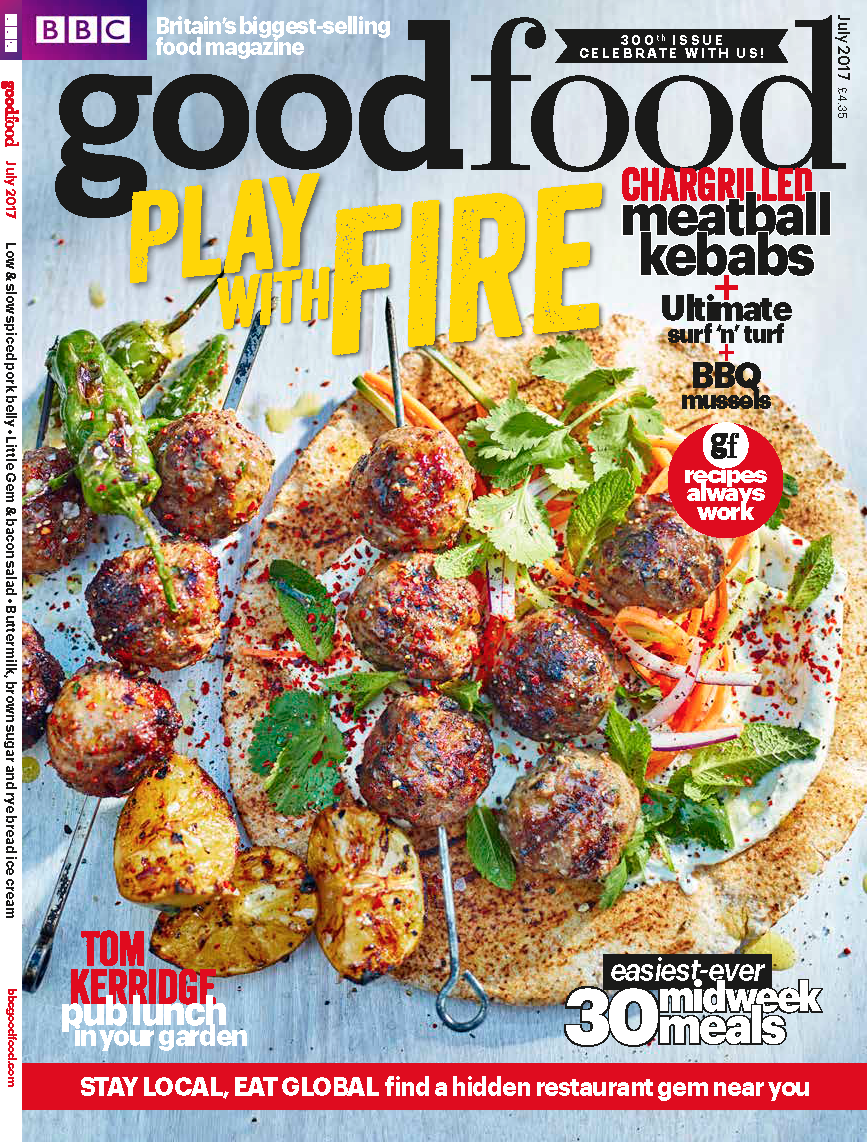[Congress speaker Q&A] How six initiatives led to stunning audience and revenue growth for BBC Good Food
These include:
1. Digital growth through engagement
2. Protecting print scale and profits
3. Expanding the editorial remit with a single editorial team
4. Experimenting with different live concepts
5. Driving innovation with strategic calls
6. Building international partnerships
 |
***Kerwin will be one of our speakers (preliminary agenda) at the FIPP World Congress, taking place from 9-11 October 2017 in London (book your tickets here), where he will share more about BBC Good Food, including how international partners can benefit from working with the brand.***
1. Driving digital growth through engagement
Bbcgoodfood.com has an audience of up to 22 million unique users per month at peak (December) and is the largest food and drink website in the UK, according to Kerwin. “Back in 2013, the website was one of the first to embrace mobile and was rebuilt to work responsively, putting our 12,000 triple-tested recipes right where our users wanted them to be… in their hands,” he said. “In 2017, 75 per cent of our user base now accesses the website through a mobile device.”

Embracing mobile was the right decision for BBC Good Food and has driven huge audience growth across the last four years, which in turn has driven a huge growth in digital advertising revenues – an average of 25 per cent increase per annum across the period, according to Kerwin. “Our audience scale is key to our commercial success and has enabled us to hold on to our direct advertising sales clients, whilst building out successful partnerships and programmatic revenues,” he said.
Kerwin highlighted BBC Good Food has also been successful at growing their non-advertising business, through initiatives like adding ‘click to buy’ functionality to their recipes in partnership with the major grocers and launching the BBC Good Food Wine Club, in partnership with wine merchant Laithwaites.
“Going forwards, we have big plans for our digital business,” he said. “We plan to increase our digital audience further, while increasing engagement levels by building out the functionality of My Good Food. We’ll use our SEO strength and social content to drive users to our site, then persuade them to join My Good Food by offering compelling tools and services, as well as increased personalisation. Key to the success of that strategy is building on our already successful content pillars of health, family, reviews, travel, restaurants and trends, as well as our core recipe and skills content.”
All of this together has meant that BBC Good Food’s digital revenues have grown faster than their print revenues have declined, allowing them to grow overall brand revenues and profits.
2. Protecting print scale and profits
The second initiative that has been crucial to BBC Good Food’s success is their commitment to protecting print scale and profit. As Kerwin explained, BBC Good Food Magazine remains the biggest paid-for magazine in the monthly food market by far with an ABC in excess of 200k copies a month.

“Our subs base remains stable and highly profitable and we’ve driven cover price in recent years to improve profits and deliver RSV for retailers,” he said.
But, the Good Food team publishes more than just the flagship magazine, in order to maximise profits. They have a stable of magazines catering to many different audience segments.
“BBC Good Food is a mainstream title about recipes and cooking, but also expanded to cover travel, restaurants, trends and shopping, based on audience interest and demand,” Kerwin said. “The Good Food team also publishes Easy Cook ten times a year, a sister title that focuses on the time-poor segment of the foodie audience, and the Home Cooking series six time a year, which focuses on genres and interests within the food scene like vegetarian, family, and health. We also publish a range of bookazines covering different areas of the food scene, from Meat to Christmas.”
BBC Good Food’s digital scale has benefited their print business, allowing them to compete with national newspaper brands for advertising campaigns and winning partnership activity which runs across all areas of the brand, Kerwin said. “By doing this, our print advertising revenues have held up as our digital business has grown in scale,” he said.
3. Expanding the editorial remit with a single editorial team
Good Food’s editorial team is a single team under the brand’s editor-in-chief, Christine Hayes. The brand has specialists for different platforms, but cross-platform content creation (including social platforms) sits at the heart of their strategy.
“At the core of BBC Good Food brand is trust and at the core of our content is a database of 12,000 triple-tested recipes which always work,” Kerwin said. “We have either created these recipes in our own test kitchen or own the IP for the ones we haven’t created ourselves. Our audience know they will work and trust us to help them with the skills they need.”
In recent years, BBC Good Food has built on that core content proposition, expanding the brand and adding a range of additional content pillars. “We now cover health, family, travel, restaurants and trends and have used that content to make BBC Good Food the ‘go to’ brand for all things food-related,” Kerwin said.
4. Experimenting with different live concepts
The fourth initiative that was crucial to BBC Good Food’s success was their willingness and ability to experiment with different live concepts, according to Kerwin.
“Our live business is an important part of the publishing mix, with over 300,000 people attending a Good Food event in the UK each year,” he explained. “The biggest shows are at the NEC in Birmingham in June and December, but we have recently launched new Good Food Shows in Belfast, London and Harrogate.”
This year, they decided to trial a new concept and so are working with the Royal Palaces to offer a new type of show under a new brand called Feast. One will be at Hampton Court in August and the other at the Tower of London in September.
“In addition,” Kerwin continued, “we offer exclusive events for our subscribers, including wine tasting and ‘money can’t buy’ restaurant experiences, as well as arranging events with some of the UK leading chefs at some of the UK leading restaurants called Good Food Eats Out.”
***Sign up for our weekly, free FIPP World newsletter to receive feature interviews, profiles, news and more in your inbox***
5. Driving innovation with strategic calls
The success of BBC Good Food’s digital business shows the importance of taking the right strategic calls at the right time.
Kerwin explains: “When bbcgoodfood.com was launched in 2006, the impact that allowing our audience to access our recipe database for free online would have on our highly profitable print business was far from clear. Ten years on, with more than 40 per cent of our profits coming from digital activities, it is clear that launching bbcgoodfood.com was the right strategic call.”
“As a business we cannot rest on our laurels though and constantly seek out new opportunities to distribute our content on new platforms. Whether that be experimenting with content on new social platforms or working within the connected home environment, it is important for Good Food to continue to take calls to future-proof the business and safeguard the future of the brand. Things on our slate at the moment include voice activated content, AI, connected kitchen products and wearable technology.
6. Building international partnerships
The last initiative launched by BBC Good Food that was crucial to their success was developing the international footprint of the brand. This initiative is also key to their future success, and they do that in three ways.
“First, we licence our brand to publishing partners in other countries. The most successful partnership we have is with CPI in the Middle East, which runs a website, magazine and awards business carrying the BBC Good Food brand,” Kerwin said.
In other territories, BBC Good Food syndicates content to other publishing partners, but they do not use the Good Food brand. “Obviously recipe content and imagery are at the heart of that, but we increasingly licence content from our new content pillars to those publishers,” Kerwin said.
Finally, BBC Good Food has a growing international audience digitally, with more than 35 per cent of their traffic coming from outside of the UK, mainly English-speaking countries like Australia, New Zealand, South Africa, Canada and the USA, Kerwin explained. “We work with programmatic partners and BBC Worldwide’s local ad sales teams to generate revenue from these overseas audiences.”
***Chris Kerwin is the publishing director at BBC Worldwide. Meet and hear more from him at the 41st FIPP World Congress, 9-11 October 2017 in London, the UK. Book your tickets here.***
More like this
BBC Worldwide on its exclusive content partnership deal with Snapchat
FIPP World Congress 2017 | Meet the speaker: Chris Kerwin, BBC Worldwide
[Congress speaker Q&A] Prisma Media transformation chief: ‘Nothing will ever be the same again’
[Congress speaker Q&A] Inside The Business of Fashion
[Congress speaker Q&A] Making a noise: the power of audio in stories
[Congress speaker Q&A] How Adweek is evolving to meet new audience demands
[Congress speaker Q&A] Building a subscription-driven business from the ground up
[Congress speaker Q&A] Building superior brand experiences through a multi-channel approach









